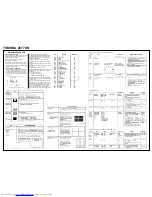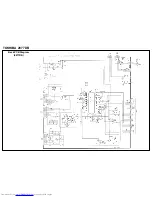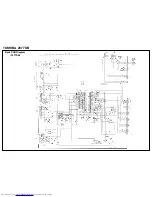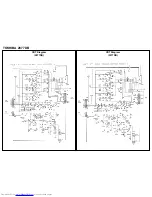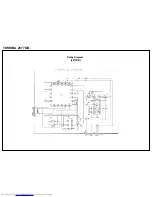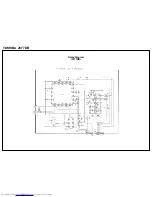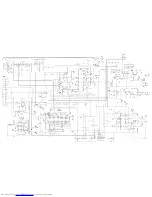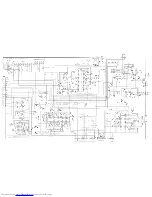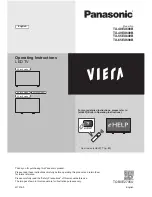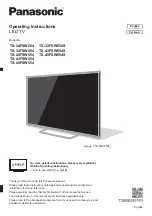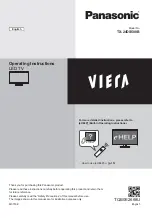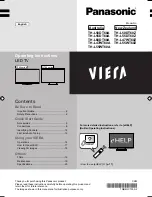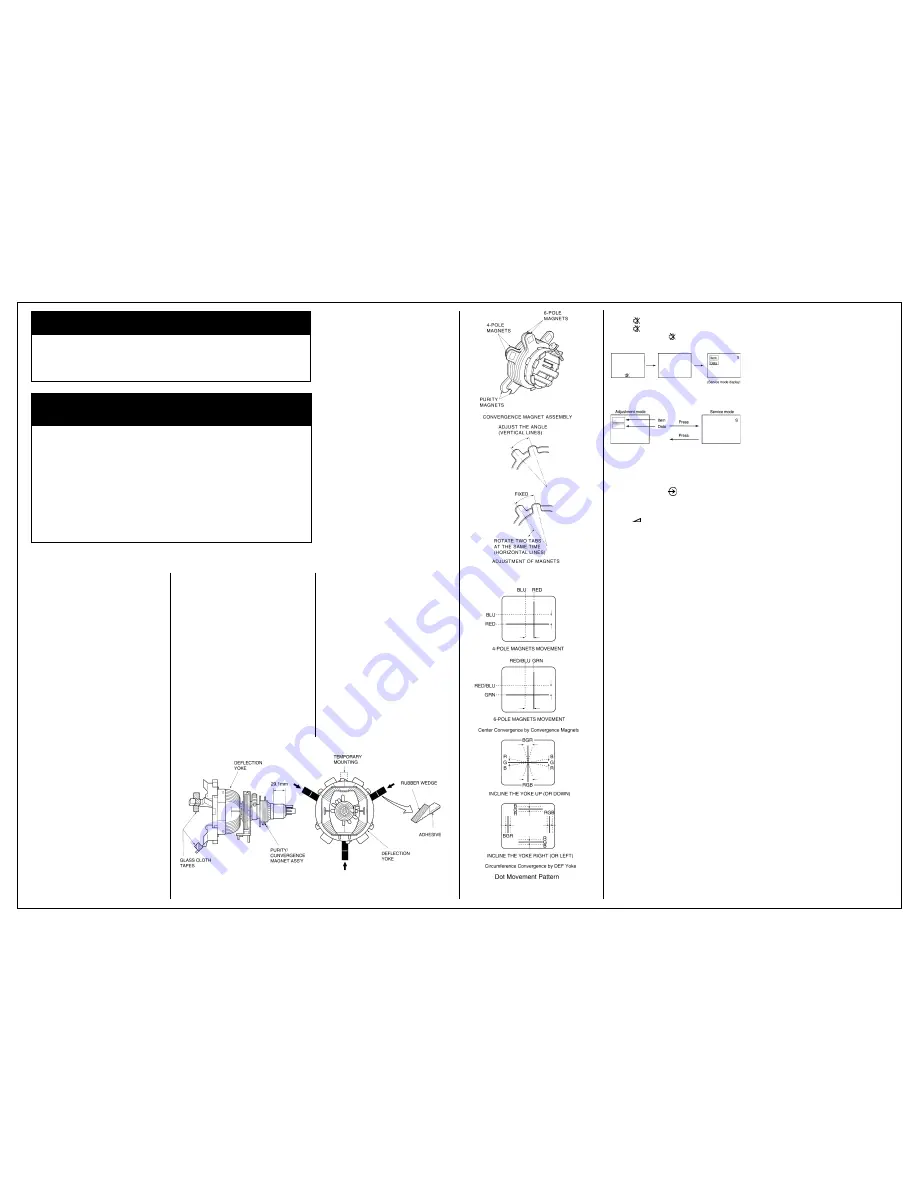
TOSHIBA 2877 DB
General Information
Also Covers
3377 DB
C7SS Chassis
C801
24082927
PF, 0.22uF,
±
20%, AC275V
C813
24092557
CD, 2200pF,
±
20%, AC125V
C814
24092557
CD, 2200pF,
±
20%, AC125V
R899
24005007
MetaI-Glazed Resistor, 8.2M ohm, 1W
L901
23200276
Coil, Degaussing, TSB-2330BR (2877DB)
L901
23200215
Coil, Degaussing, TSB-2340AR (3377DB)
T461
23236447
Transformer, Flyback, TFB4115AR
T803
23217301
Transformer, Converter, TPW3336AR
Q826
A8643108
Photo Coupler, TLP621(GR-LF
F470
23144502
Fuse, 1.0A
F801
23144507
Fuse, 3.15A
F802
23144506
Fuse, 2.5A
S801
23344395
Switch, Power
V9O1A
23902891
Socket, CRT, 10P
Z889
23144543
Protector, PRF50005491, 125V, 5A
Z890
23144543
Protector, PRF50005491, 125V, 5A
Z891
23144543
Protector, PRF50005491, 125V, 5A
Z895
23144450
Protector, PRF2000, 125V, 2A
V901
23312715
Picture Tube, A66EAK552X21 (2877DB)
V901
23312653
Picture Tube, A80EFF002X11 (3377DB)
Recommended Safety Parts
Item
Part No.
Description
1. Excessive high voltage can produce poten-
tially hazardous X-RAY RADIATION. To avoid
such hazards, the high voltage must not be
above the specified limit. The nominal value
of the high voltage of this receiver is 31 .5 kV
at zero beam current (minimum brightness)
under a 240V AC power source. The high
voltage must not, under any circumstances,
exceed (A) kV.
2877DB
3377DB
(A) 32kV
33kV
Each time a receiver requires servicing, the
high voltage should be checked following the
HIGH VOLTAGE CHECK procedure in this
manual. It is recommended that the reading of
the high voltage be recorded as a part of the
service record. It is important to use an
accurate and reliable high voltage meter.
2. The only source of X-RAY RADIATION in this
TV receiver is the picture tube. For continued
X-RAY RADIATION protection, the replace-
ment tube must be exactly the same type tube
as specified in the parts list.
3. Some parts in this receiver have special
safety-related characteristics for X-RAY
RADIATION protection. For continued safety,
parts replacement should be undertaken only
after referring to the PRODUCT SAFETY
NOTICE below.
The following adjustments should be made
when a complete realignment is required or a
new picture tube is installed.
Perform the adjustments in order as follows:
1. Color Purity
2. Convergence
3. White Balance
Note: The PURITY/CONVERGENCE MAGNET
assembly and rubber wedges need mechanical
positioning.
Refer to figure 2.
COLOR PURITY ADJUSTMENT
NOTE : Before attempting any purity adjust-
ments, the receiver should be operated for at
least fifteen minutes.
1. Demagnetize the picture tube and cabinet
using a degaussing coil.
2. Set the brightness and contrast to maximum.
3. Use a green raster from among the built-in
test signals.
4. Loosen the clamp screw holding the yoke and
slide the yoke backward or forward to provide
vertical green belt (zone) in the picture
screen.
5. Remove the Rubber Wedges.
6. Rotate and spread the tabs of the purity
magnet (See figure 3.) around the neck of the
picture tube until the green belt is in the
center of the screen. At the same time, enter
the raster vertically.
7. Slowly move the yoke forward or backward
until a uniform green screen is obtained.
Tighten the clamp screw of the yoke tempo-
rarily.
8. Check the purity of the red and blue raster.
Figure 2
CONVERGENCE ADJUSTMENTS
NOTE: Before attempting any convergence
adjustments, the receiver should be operated for
at least fifteen minutes.
CENTER CONVERGENCE ADJUSTMENT
1. Use the cross-dot pattern from among the
built-in test signals.
2. Set the brightness and contrast for well
defined pattern.
3. Adjust two tabs of the 4-Pole Magnets to
change the angle between them (See figure
3.) and superimpose red and blue vertical
lines in the center area of the picture screen.
4. Turn the both tabs at the same time keeping
the angle constant to superimpose red and
blue horizontal lines at the center of the
screen.
5. Adjust two tabs of 6-Pole Magnets to
superimpose red/blue line and green one.
Adjusting the angle affects the vertical lines
and rotating both magnets affects the hori-
zontal lines.
6. Repeat adjustments 3, 4, 5 keeping in mind
red, green and blue movement, because 4-
Pole Magnets and 6-Pole. Magnets have
mutual interaction and make dot movement
complex.
CIRCUMFERENCE CONVERGENCE ADJUST-
MENT
1. Loosen the clamping screw of deflection yoke
slightly to allow the yoke to tilt.
2. Temporarily put a wedge as shown in figure 2.
(Do not remove cover paper on adhesive part
of the wedge.)
3. Tilt front of the deflection yoke up or down to
obtain better convergence in circumference.
(See figure 4.) Push the mounted wedge into
the space between picture tube and the yoke
to fix the yoke temporarily.
4. Put other wedge into bottom space and
remove the cover paper to stick.
5. Tilt front of the yoke right or left to obtain
better convergence in circumference. (See
figure 4.)
6. Keep the yoke position and put another
wedge in either upper space. Remove cover
paper and stick the wedge on picture tube to
fix the yoke.
7. Detach the temporarily mounted wedge and
put it in another upper space. Stick it on
picture tube to fix the yoke.
8. After fixing three wedges, recheck overall
convergence. Tighten the screw firmly to fix
the yoke and check the yoke is firm.
9. Stick three adhesive tapes on wedges as
shown in figure 2.
Figure 3
Figure 4.
1. ENTERING SERVICE MODE
1) Press
button once on Remote Control.
2) Press
button again to keep pressing.
3) While pressing the
button, press MENU
button on TV set.
2. DISPLAYING THE ADJUSTMENT MENU
1) Press MENU button on TV.
3. KEY FUNCTION IN THE SERVICE MODE
The following key entry during display of
adjustment menu provides special functions. A
single horizontal line ON/OFF:
-/-- button (on Remote)
Test signal selection:
button (on Remote)
Selection of the adjustment items: Channel UP/
DOWN (on TV & Remote)
Change of the data value:
Volume.
+/- (on TV & Remote)
Adjustment menu mode ON/OFF: MENU button
(on TV)
Initialisation of the memory (QA02) :
CALL + Channel button on TV (UP)
Reset the count of operating protect circuit to
“00”: CALL + Channel button on TV (DOWN)
“RCUT” selection: 1 button
“GCUT” selection: 2 button
“BCUT” selection: 3 button
“CNTX” (or “SCNT”) selection: 4 button
“COLC” selection: 5 button
Color thickness
“TNTC” selection: 6 button correction
Test audio signal ON/OFF (1 kHz):
8 button note: Displayed differently as shown
below, depending on the setting of the receiving
color system.
COLP (PAL)
COLC (NTSC)
COLS (SECAM)
Self diagnostic display ON/OFF: 9 button
4. SELECTING THE ADJUSTING ITEMS
Every pressing of CHANNEL UP button
changes the adjustment items in the following
order. (DOWN button for reverse order.)
(See Table Opposite).
This item may require adjustments by models
after initialization, when QA02 is replaced.
5. ADJUSTING THE DATA
Pressing of VOLUME +/- button will change the
value of data in the range from 00 to FF. The
variable range depends on the adjusting item.
6. EXIT FROM SERVICE MODE
Press POWER button to turn off the TV once.
INITIALIZATION OF MEMORY DATA OF QA02
After replacing QA02, the following initialization
is required.
1) Enter the service mode, then select any
register item.
2) Press and hold the CALL button on the
Remote, then press the CHANNEL UP button
on the TV. The initialization of QA02 has been
completed.
3) Check the picture carefully. If necessary,
adjust any adjustment item above. Perform
“AUTO Search Memory”.
CAUTION: Never attempt to initialize the data
unless QA02 has been replaced.
X-Ray Note
Summary of Contents for 3377 DB
Page 3: ...TOSHIBA 2877 DB Back PCB Diagram 2877DB ...
Page 4: ...TOSHIBA 2877 DB Back PCB Diagram 3377DB ...
Page 5: ...TOSHIBA 2877 DB CRT Diagram 2877DB CRT Diagram 3377DB ...
Page 6: ...TOSHIBA 2877 DB Dolby Diagram 2877DB ...
Page 7: ...TOSHIBA 2877 DB Dolby Diagram 3377DB ...
Page 8: ......
Page 9: ......
Page 10: ......
Page 11: ......


